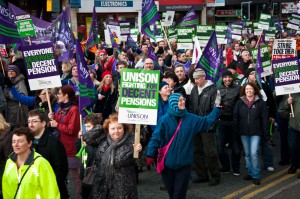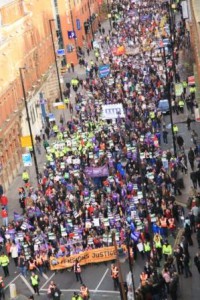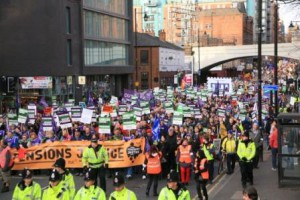Manchester rallies for biggest strike in a generation
Article published: Thursday, December 1st 2011
Tens of thousands have marched through the city centre as 150,000 public sector workers across Greater Manchester took part in the biggest strike action of the post war era to defend pensions and the welfare state against government cuts.
They joined two million public sector workers and almost 30 unions across the country in the November 30 national “day of action” called for by the Trades Union Congress. Many who took part in the good-natured march through the city said they had never taken part in industrial action before but had been driven to it by a government which saw them as a “soft target” to pay for the financial crisis.
Roy, a radiographer picketing outside Manchester Royal Infirmary, said that as a health worker his decision to strike was “one of the hardest decisions I’ve made.” But for him the matter was “simply about fairness. We don’t feel you can take a contract and tear it up in somebody’s face without proper negotiations and then just railroad all over them.”
Pickets were held at hospitals, colleges, courts and council buildings across the city throughout the bright, chilly morning. The strike was called due to government plans to raise the retirement age for public sector workers and impose a 3.2 per cent increase in employee pension contributions, amounting to the loss of a day’s wage each month.
Roy said past negotiations between unions and the government were “clearly not sincere” and “a smokescreen from day one”. For him, the attack on pensions was “just asking a certain subgroup to pick up the deficit for somebody else…you give a man a gun he can rob a bank, you give a man a bank he can rob the world.”
Squeezed wages
Incomes have already been squeezed by a combination of a public sector pay freeze and the rising cost of living during the recession. Housing worker Sahana Syed explained the impact on her family: “Even though I’m working I’m actually worse off now than I’ve ever been”, she said. “My husband doesn’t come home from work until about 7.30pm”, she added, saying “management always think they can dump on you when they expect you to take it and not make a stand at all.”
She too had little confidence in the government’s good will. “I think he’s a joke, George Osborne, he hasn’t got a clue how the other half live. He’s in his own ivory tower, completely oblivious to how the working class live at all. He can’t relate to us, he can’t understand what we’re going through or know how hard it is to make ends meet at the moment”, she said.
At midday around 20,000 strikers and supporters armed with whistles, drums, vuvuzelas and banners marched through the city centre as shoppers looked on and office workers peered out from their windows. Most were there to take in the spectacle and snap pictures on their mobile phones, though at several points onlookers and people watching from windows above applauded as the march snaked past and over one hundred medical workers lined the route and cheered as demonstrators passed the Manchester Royal Infirmary.
Public and private workers
Some looking on from the highest office floors were less enthused, with occasional windows bearing signs on which were scrawled messages such as “why should I pay for your greedy pensions” or “what a joke you people are.”
Strikers were quick to disavow any divide between public and private sector workers however, saying the government’s policies were hurting all. “We don’t want the public themselves to get caught up in this myth that it’s the public sector against the private sector. It’s not, it’s all of us, it’s the 99 per cent of us here against the 1 per cent” said Manchester Unite branch secretary Jimmy Thornton.
Manchester Unison branch secretary Pat McDonagh labelled claims that public sector workers enjoy “gold plated pensions” as “utter nonsense” and “Tory spin”. He said: “The average pension in local government which I know from my own service is £4,200 but the average for women members in local government is only £2,800”, pointing out how “if they didn’t get a pension they would have to rely on state benefits, and that’s when the taxpayer really would pay for it.”
An attack on all services
Adult social care worker Lesley Lancelott said pensions were “just the tip of the iceberg” and viewed the cuts to pensions as part of a wider attack on all services. “I work for adult social care and Manchester’s been hit really, really hard”, she said. “For ordinary people in need of care and support it’s going to cost more, they’re going to get less, they’re going to have to wait longer to keep safe and secure in their own homes.”
She also pointed out how public sector workers, often low paid, would themselves face a loss of a day’s pay for the industrial action which many could ill afford. “My partner is on minimum wage, I work three days a week, it’s going to really cost us. It’s coming out of next month’s pay, Christmas pay, that’s really going to impact on us. This is going to cost us dearly for standing up and fighting back and defending public services.”
Unite steward Kerry Feetham explained how “this is the first time I’ve ever been on strike in my career and it is difficult and people have to make a really difficult choice about going on strike”, saying “we’re passionate people who work in the public sector to provide services like healthcare and education.”
Nevertheless, she argued it was necessary. “I don’t care what George Osborne says, this will make a difference. There’s two million people coming together and I think people realise that it is worth that one day coming out on strike.”
David Cameron was quick to label the day’s action a “damp squib”, while other ministers instead denounced the “disruption” caused by the strike. But away from the war of words in Westminster several on the pickets felt the day was a show of strength to be built on. As Lesley put it: “If this action will make no difference why is he in such a lather about it? Why are they all in such a lather about it?”
Richard Goulding
More: News, Unions and workplace
Comments
-
The strikers are demanding that the current unfair public pension schemes are left as they are – that is they want to get far more out of the scheme than the investment of their contributions warrant, and they want the huge difference paid by every taxpayer in the country, including the vast majority of us who don’t get pensions anywhere near as good as even the ones the government is proposing for public sector staff.
That’s what makes these strikes a shocking display of selfishness and greed, and blows the myth of the caring public sector worker for ever.
Pensions schemes are savings schemes. It is immoral, socially unfair and divise for the government to run a saving scheme for its own employees giving them a fantastic and ultra generous return on their investment, paid for by everyone else’s taxes.
Comment by simon on December 1, 2011 at 11:06 pm -
Simon is missing the point: We didn’t strike for ourselves, we were striking for everyone who has been kicked and fucked over by the Tories, private sector or public sector. I have worked in both the private sector and the public sector. I have had three private sector jobs and two public sector jobs. I happen to currently work in the public sector as a library assistant at a university: We have been kicked twice, firstly by the Brown Report, and by the cuts. The pension reforms were the last straw. I am equally as much striking for your right to a decent pension as I am for my right to a decent pension, if you think I’m a selfish bitch for doing that then you will no doubt follow Jeremy Clarkson’s call that I be executed in front of my family.
Comment by Caroline on December 1, 2011 at 11:40 pm -
Francis Maude’s publicly funded pension is £43,825 a year with a pot of £731,883
David Cameron’s publicly funded pension is £32,978 a year with a pot of £550,725
George Osborne’s publicly funded pension is £32,978 a year with a pot of £550,725
Nick Cleggs’s publicly funded pension is £28,404 a year with a pot of £440,000
Eric Pickles’ publicly funded pension is £43,825 a year with a pot of £731,883
Vince Cable’s publicly funded pension is £39,551 a year with a pot of £660,507
Andrew Lansley’s publicly funded pension is £39,551 a year with a pot of £660,507
Danny Alexander’s publicly funded pension is £26,404 a year with pot of £440,942
All in it together, eh?
Comment by Nim Chimsky, An Infinite Number Of Typewriters on December 2, 2011 at 2:48 pm -
Caroline, I’m not to inclined to believe you.
If public sector workers had been so concerned about the scrapping of generous pension schemes they’d have gone on strike about 10 years ago when the avalanche of final salary pension schemes were being ended.
But they didn’t.
They went on strike when their own ultra-generous pension schemes came under threat.
That’s why I say that the current strikes are simply selfish and greedy.
Public sector workers didn’t give a monkey’s while generous private pension schemes were being shut right, left and centre for the last 15 years.
So why do you expect everyone else to care when public sector workers are expected to take a tiny bit of their share of the hard times?
Comment by simon on December 2, 2011 at 10:44 pm -
Simon, you are wrong on so many counts that it hurts.
Whilst arguably it may have been honourable for public service workers to have gone on strike to defend the final salary pensions of private sector workers, that would have been illegal, under the UK’s anti-trade union laws that you, as a right-winger, no doubt would approve of.
Secondly, public sector pensions schemes are not, nor have they evey been ultra generous. Boring though it might be for those who prefer to get their public sector pensions ‘facts’ from the Daily Mail or Express, most public sector pensions in payment are less than £5,600 a year. £3,000 in local government. Half of women public service pensioners get less than £4,000 a year.
The vast majority of public sector workers do give a monkeys about the scandal that allows private sector employers to exploit their workers and refuse to provide them with access to a decent, contributory pension scheme. We don’t live in different worlds. That’s why the people out on strike on Wednesday were asking for decent pensions for all; so perhaps you should support this campaign because it’s in everyone’s interests.
I suspect however that your poisonous cynicism means you’ll continue to judge others by the mean standards of your own outlook on life.
Comment by Rod on December 3, 2011 at 12:16 am -
Simon, will the destruction of pension schemes in the public sector help people without pensions working in the private sector? Of course not. The Tories want to steal £billion of our money from our pensions schemes to give to their banker mates who ruined the economy.
This strike is not just about pensions though. Its about you and your future too. Do you want your kids taught by 65 year old teachers.
Who will wipe your arse when you get demented? – a 67 year old care worker? Will a 64 year old fire fighter carry you to safety from a burning building? That is what ‘working longer’ means.Simon! If 3 million workers have pay cuts for the next ten years who will buy the stuff that the private sector sells? Not us we will be skint – and the result will be private sector people losing jobs.
My son works in the private sector. Will he be better off if his dad has a pension cut?
Simon.You have not thought this through. Do not fall for the lies spread by the 1%.
BTW Do you have a pension?
Comment by Mark Krantz on December 3, 2011 at 1:48 am -
FIGHT ON TO SMASH THE SYSTEM .
Comment by DAVE HATES POLITICIANS on December 3, 2011 at 5:55 pm -
Good points from Mark and Rod
Simon. I hope you’ll agree that everyone deserves the right to a fair pension in old age? Since the average public sector pension only provides the individual with £4 a week (?) more than the officially recognised poverty line (when added to the state pension), surely you should be joining us in campaigning for fair pensions for all??
Yes we argue that they shouldn’t be changed – they are affordable. There are numerous sources which have supported that
Comment by Matt on December 4, 2011 at 1:08 am -
‘Simon, will the destruction of pension schemes in the public sector help people without pensions working in the private sector? Of course not.’
How wrong you are Mark.
Public sector staff currently pay a proportion of their salary into their pension scheme. That proportion is about the same as many private sector staff pay into their pensions schemes.
However, nearly all private pension schemes pay out pensions based on the return on the investment of the contributions, whereas public sector schemes guarantee a pension based entirely on inflation, years of service and final salary.
For many years now this has meant that the contributions public sector workers make to their pension schemes would go nowhere near funding the incredibly generous pensions that are currently guaranteed. The difference is made up by all taxpayers, including the low paid and poorly pensioned, most of whom work in the private sector.
A large proportion of council tax payments goes directly to making up the shortfall between the pensions public employees would get from their contributions and the pensions they actually receive.
The ending of the ultra-generous public sector schemes will be a good thing for most workers, who will no longer need pay so much money into the pension schemes of public employees. This means they can save the money for their own retirement if they so wish, or that more of their council tax payments can go to providing services rather than superb pensions for people who just happen to sell tyheir labour to the state.
Comment by simon on December 4, 2011 at 6:52 pm -
Simon, the public pension cuts aren’t being used to pay for tax cuts for the majority, they’re being used to pay for all sorts of extra perks for the financial elite.
Comment by Alison on December 6, 2011 at 2:11 am -
Alison, that comment is simply silly.
The government is not cutting public pensions for fun.
It is cutting them for exactly the same reason private firms, including such firms as the Co-operative so beloved of ‘liberals’ and socialists, cut pension schemes in recent years.
It’s because the contibutions to the scheme from employer and employee no longer have any chance of funding the pensions the employee was promised.
With private schemes there is no external money source to prop up a failing pension scheme. With public pension schemes there is – the taxpayers, including millions of private sector workers on average or poor wages, and much less generous pension schemes that public sector workers.
The current pension arrangements for the public sector are like Robin Hood in reverse, with a poorly pensioned private sector paying entirely for their own pensions, and paying extra tax because public sector workers get superb pensions which they are only expected to part fund from their contributions.
Nobody could object to public sector workers getting fantastic pensions if they paid for them all by themsleves, but as private sector workers already know a typical contribution of 6% of wages does not get you a final salary, index linked pension plus early retirement. That’d cost about 35% of wages, so if public sector workers want such benefits that’s what they should pay.
Only a very selfish or financially clueless public sector worker could want such an unfair state of affairs to continue.
Unfortunately many public sector workers are both very selfish and financially clueless, hence the strikes.
Comment by simon on December 9, 2011 at 9:55 am -
The contributions made by NHS staff each year exceed the payments to retired NHS staff by £2 billion pounds a year. Where does the govt stick that dosh. Simple Simon it trousers it. just the facts.
Comment by John Jordan on December 12, 2011 at 6:18 pm
The comments are closed.








